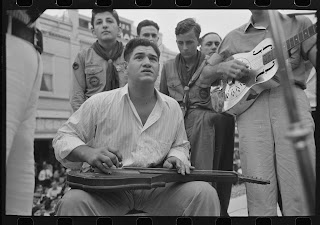Papa Cairo was a lap steel guitarist originally from New Orleans, living in Crowley. Having become friends with Joe Falcon and Cleoma Breaux, he would play with several musicians around the Crowley area, including Leo Soileau, until he joined Werner's group in 1937. He started out playing guitar flat across his knees with a metal finger attachment, and when the first steel guitars appeared he was quick to buy one, mystifying his audiences by taking his hands off the instrument and holding the notes with his feet on the pedals. Happy Fats noticed he always wore a diamond-shaped gem on his tie and finger and gave him the nickname based on the Cajun French word for "diamond" ("carreau", pronounced "cairo").
Although the first recording of this melody as a Cajun tune was by the Guidry Brothers called "Le Garcon Negligent" in 1929, his tune was based on the Jolly Boys of Lafayette called "Abbeville", the band used the melody to record the song the 1937 song: "Alons Kooche Kooche" (#17040).
Tu m'as quitté pour t'en aller à l'anse Kooche Kooche
Pour t'en aller toi tout(e) seul(e) à l'anse Kooche Kooche
Criminelle! Comment j'va faire moi tout seul?
Tu m'as quitté pour t'en aller, pour t'en aller
Tu m'as quitté pour t'en aller
Pour t'en aller toi tout(e) seul(e) à l'anse Kooche Kooche
Criminelle! Comment j'va faire moi tout seul?
Tu m'as quitté pour t'en aller, pour t'en aller
Tu m'as quitté pour t'en allerPour t'en aller à l'anse Kooche Kooche toi tout(e) seul(e)Criminelle! Comment j'va faire moi tout seulTu m'as quitté pour t'en aller dans l'anse Kooche KoocheHey ! Kooche Kooche !
 |
| Julius "Papa Cairo" Lamperez |
In the 1940s, he was drafted into the US Army, became a Sergeant. Lamperez would enter WWII, end up being captured by the Nazis, and held as POW in a stalag. His sister explains that he escaped four times but never got very far. While captured, he had made a fiddle to entertain the guards and his popularity kept him from being executed. After his last prison escape with a group of men, the Germans killed all the escapees except for a dentist and Julius. However, after the war, he would return to music, recording with many local musicians, yet he never forgot the melody of this song.
You left me to go to the Kooche Kooche cove,
You went all alone to the Kooche Kooche cove,
Criminal! How will I handle this by myself?
You left me to go far away, went away.
You left me to go far away,
You went all alone to the Kooche Kooche cove,
Criminal! How will I handle this by myself?
You left me to go far away, went away
You left me to go far away,To go to the Kooche Kooche cove all alone,Criminal! How will I handle this by myself?You left me to go far away to the Kooche Kooche coveHey there! Kooche Kooche!
 |
| Chuck Guillory's band. Herman Durbin, Jimmy Newman, Chuck Guillory, Kersey "Pork Chop" Roy, R.R. Sagg (emcee), Papa Cairo |
While the title is labeled with the misspelled Cajun french word allons (which means "to go"), given the context of the lyrics, it actually a different word, l'anse, which can mean cove or a "bend in the river" or "bend in the trees". It's named after the community "L'anse Couche-Couche" located along Hwy 92 between Mermentau and Morse in Acadia Parish. Couche-couche, itself, is the Carribean Creole cornbread dish served around South Louisiana. Unlike the Arabic version of couscous (kuskus) which uses durham wheat, the Cajuns replaced this with cornmeal mush.
The melody would be used in Lamperez's recording of "Big Texas"; first with Chuck Guillory's band. Eventually he would form his own group, Papa Cairo and His Boys which included Don Lane on xylophone, Murphy Smith on fiddle, Herman Durbin on piano, Albert Roy on guitar and possibly Pete Duhon on bass. He had spent years trying to get his song noticed, later recording it for J.D. Miller's Feature label in French and then later in English. That same year, he and Jimmy Newman re-recorded the tune for Modern's Colonial label, simply known as "Kooche Kooche". However, after his recording was used by Hank Williams for his famous song, "Jambalaya", and the song's success went nationwide, Lamperez turned his back on recording in disgust.
- South to Louisiana: The Music of the Cajun Bayous By John Broven
- Discussions with Kevin Fontenot
- Kevin Fontenot (August 15, 2012). "Over These Prison Walls I Would Fly: Country Music POWs During World War II". Interview with Margie Lamperez
- Cajun Breakdown : The Emergence of an American-Made Music By Ryan Andre Brasseaux
- Kevin Coffey, liner notes. Swingbillies: Hillbilly and Western Swing on Modern/Colonial/Flair 1947-52. Ace Records.
Find:
Cajun: Rare & Authentic (JSP, 2008)


No comments:
Post a Comment
Got info? Pics? Feel free to submit.